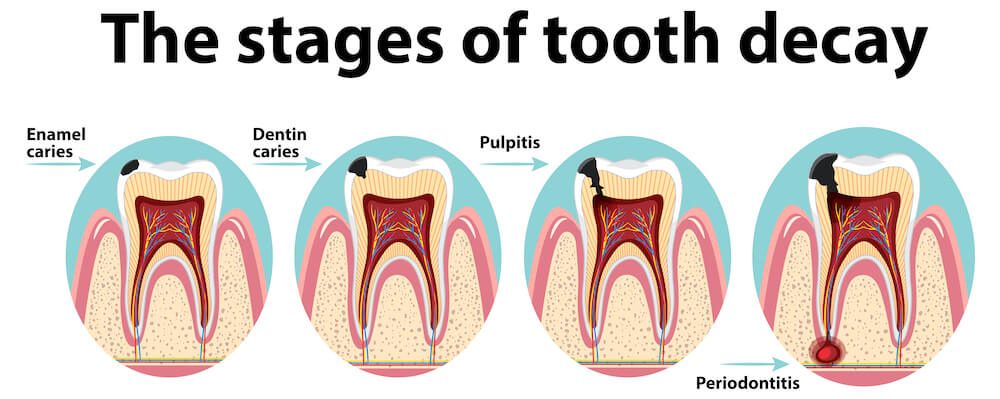Ask the Dentist: Why are carbohydrates and sugar bad for your teeth?

When it comes to maintaining good oral health, many Australians understand the importance of brushing and flossing daily, as well as visiting the dentist regularly.
However, one of the most overlooked aspects of dental health is diet, particularly the impact of carbohydrates and sugar on teeth.
At My Local Dentists, we often get asked by patients: “Why are carbohydrates and sugar bad for your teeth?” In this comprehensive blog, we explore the science behind tooth decay, the role of sugar and carbohydrates, and how you can protect your smile for years to come.
The Link Between Diet and Dental Health
Diet plays a crucial role in oral health. What you eat directly affects the health of your teeth and gums. According to the Australian Dental Association (ADA), a diet high in sugar and processed carbohydrates can significantly increase the risk of tooth decay and gum disease (ADA, 2023).
While most people know that candy and soft drinks can be harmful, fewer realise that even seemingly healthy foods like bread, pasta, and fruit juices can contribute to dental problems.

What Happens in the mouth when You Eat Carbohydrates and Sugar?
When you consume foods rich in sugar and simple carbohydrates, the bacteria in your mouth feed on these substances and produce acid as a byproduct.
This acid attacks the enamel, which is the hard, protective outer layer of your teeth. Repeated acid attacks can weaken and eventually erode enamel, leading to cavities and tooth decay.
The Process in Detail:
- Consumption: You eat sugary or starchy foods.
- Fermentation: Oral bacteria, especially Streptococcus mutans, feed on these sugars and ferment them.
- Acid Production: This fermentation process produces lactic acid.
- Demineralisation: The acid lowers the pH in your mouth, dissolving essential minerals like calcium and phosphate from the enamel of the tooth.
- Cavities (Tooth Decay) Form: Over time, the enamel of the tooth breaks down, forming cavities, otherwise known as tooth decay and holes.

The Role of Carbohydrates in Tooth Decay
Carbohydrates are a major source of energy for the body, but not all carbs are created equal.
There are two main types:
- Simple Carbohydrates: Found in sugary snacks, soft drinks, pastries, and processed foods. These are broken down quickly in the mouth and can spike blood sugar levels.
- Complex Carbohydrates: Found in whole grains, vegetables, and legumes. These are digested more slowly and pose less of a risk to dental health.
Unfortunately, even complex carbohydrates can contribute to decay if they are sticky or consumed too frequently. Foods like white bread and crackers can cling to teeth and provide a feast for harmful bacteria.
Why Sugar Is Particularly Harmful
Sugar is the primary fuel for acid-producing bacteria, especially inside the mouth. The World Health Organization (WHO) and the ADA recommend limiting free sugar intake to reduce the risk of tooth decay and other health issues (WHO, 2015; ADA, 2023). Free sugars include those added to foods and beverages, as well as naturally occurring sugars in honey, syrups, and fruit juices.
When you consume sugar frequently, your mouth remains in an acidic state, giving your enamel little time to recover.
Acid burns and eats away at your teeth causing it to become thin or cavitated. Saliva helps neutralise acid and repair enamel through remineralisation, but constant sugar exposure overwhelms this natural defence.
Common Hidden Sources of Sugar and Carbohydrates
Many Australians are surprised to learn that sugar and harmful carbs hide in everyday foods, including:
- Breakfast cereals
- Sports and energy drinks
- Flavoured yoghurts
- Sauces and condiments
- White bread and crackers
- Muesli bars
- Fruit juices and smoothies
Even “healthy” snacks marketed for kids often contain alarmingly high levels of sugar.
Dental Health in Australia: A Snapshot
According to the 2018 Australian National Survey of Adult Oral Health:
- Almost half of all Australians over 15 have untreated tooth decay.
- 32% of adults have untreated cavities.
- 40% of children aged 5–10 years have experienced decay in their baby teeth.
These statistics underscore the urgent need for better dental health awareness, oral hygiene education and better understanding of dietary habits.
Tips to Reduce Sugar and Carb-Related Tooth Damage
- Limit Snacking: Constant snacking keeps your mouth acidic. Stick to designated meal times and limit between-meal snacking.
- Drink Water: Water helps rinse away food particles and acids. Fluoridated tap water also helps strengthen enamel.
- Choose Whole Foods: Opt for vegetables, nuts, cheese, and lean proteins instead of processed snacks.
- Read Labels: Check for hidden sugars in packaged foods. Look for terms like sucrose, glucose, and fructose.
- Use a Straw: When drinking sugary or acidic beverages, use a straw to minimise contact with teeth.
- Rinse After Eating: Rinse your mouth with water after eating sugary or starchy foods.
- Chew Sugar-Free Gum: Stimulates saliva flow, which helps neutralise acids and repair enamel.
- Brush and Floss: Brush twice a day with fluoride toothpaste and floss daily.
- Regular Dental Visits: See your dentist every six months for check-ups and cleanings.
Can You Still Enjoy Sweet Foods?
Absolutely! Moderation and timing are key. It’s better to consume sugary treats as part of a meal rather than as a standalone snack. Your mouth produces more saliva during meals, which helps neutralise acid and wash away food particles.
DRINK WATER AFTER SWEETS. It will help wash away the sugar content. Water is God’s natural gift to us for strong healthy teeth!
Additionally, consider healthier alternatives such as:
- Fresh fruits instead of fruit juices
- Dark chocolate in moderation instead of milk chocolate
- Natural sweeteners like xylitol, which has been shown to reduce cavity-causing bacteria (Maguire & Rugg-Gunn, 2003)

The Role of Fluoride
While the ability to do our own research has been amazing with social media and the internet, the topic of fluoride and its effects on our health has become controversial and even polarising.
What is conclusive from a dental health perspective is that fluoride plays a significant role in protecting your teeth from sugar and carbohydrate damage.
There is strong evidence in systematic reviews showing that when applied topically as varnish or toothpaste forms, fluoride helps to prevent and decrease the rates of dental caries*.
It helps remineralise enamel and makes it more resistant to acid attacks. Using fluoride toothpaste and fluoride varnishes are simple and effective ways to enhance your dental defences.
* Walsh T, Worthington HV, Glenny AM, Marinho VCC, Jeroncic A. Fluoride toothpastes of different concentrations for preventing dental caries. Cochrane Database of Systematic Reviews 2019, Issue 3. Art. No.: CD007868. DOI: 10.1002/14651858.CD007868.pub3. Accessed 02 May 2025.
*Fluoride supplements, dental caries and fluorosis: A systematic review” Amid I. Ismail, Hana Hasson 2014. https://www.sciencedirect.com/science/article/abs/pii/S000281771463899X?
*Almoharib, Bander K., et al. “The Efficacy of Fluoride and Others in Caries Prevention: A Systematic Review.” International Journal of Health Sciences, vol. 2, no. S1, 2018, pp. 79-94, doi:10.53730/ijhs.v2nS1.15033.
Educating the Next Generation
Instilling good dietary and oral hygiene habits in children is crucial. Parents should:
- Avoid giving food, bottles of juice or milk at bedtime
- Limit sugary snacks and drinks
- Encourage regular brushing twice a day with fluoride toothpaste and encourage daily flossing
- Teach children about the importance of dental visits and check ups
By starting early, we can raise a generation with healthier smiles.
When to See a Dentist
We encourage all our patients to visit the dentist every 6 months starting from the age of 2 years old. It’s like taking your car for a service every 10,000km or mowing your lawn regularly to ensure everything stays working and healthy.
It is all about preventative health and proactively keeping the teeth healthy. Often, we don’t become sick or unfit suddenly, but rather over time from unhealthy habits that become bigger and bigger problems.
If you notice signs of tooth decay such as sensitivity, pain when eating sweets, or visible pits in your teeth, you should definitely visit a dentist to work out what’s happening and prevent it from getting worse. Early intervention can prevent the need for more extensive and expensive treatments later.
Conclusion: Your Smile Is Worth Protecting
Carbohydrates and sugar are a part of everyday life, but understanding their impact on dental health can empower you to make smarter choices. By limiting your intake, practising good oral hygiene, and seeing your dentist regularly, you can enjoy a healthier smile and reduce your risk of tooth decay.
At My Local Dentists, we’re committed to helping you maintain optimal oral health. If you have any questions or concerns about your diet and dental health, don’t hesitate to book an appointment with our wonderful team. Your smile is worth it.
